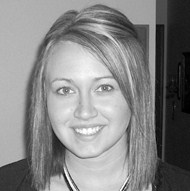 Sarah Dillard, Fiction Editor for the dazzling new issue of Superstition Review, shared a few moments of her busy schedule with me to discuss her experiences as a student intern. An Illinois native, Sarah joined the Literature, Writing, and Film major at Arizona State University’s Polytechnic campus in 2007 after a few years in Indiana. This is her first semester with Superstition Review. She will pass her knowledge along to next semester’s interns as she wraps up her undergraduate career in preparation for next month’s graduation.
Sarah Dillard, Fiction Editor for the dazzling new issue of Superstition Review, shared a few moments of her busy schedule with me to discuss her experiences as a student intern. An Illinois native, Sarah joined the Literature, Writing, and Film major at Arizona State University’s Polytechnic campus in 2007 after a few years in Indiana. This is her first semester with Superstition Review. She will pass her knowledge along to next semester’s interns as she wraps up her undergraduate career in preparation for next month’s graduation.
Haley Larson: What is your preferred genre as a writer? As a reader?
Sarah Dillard: As I writer, I prefer to write Nonfiction because it allows me to tap into my inner emotions to create a piece of work that emulates my life and beliefs in some form. When I first began taking nonfiction writing courses last semester, I was a bit intimidated by the process of writing about myself and allowing others to read my work. Since then, I have been able to reflect on my writing and release any inhibitions that I previously had. As a reader however, I prefer fiction pieces because they allow me to escape my own reality and focus on something new and interesting.
HL: Who influences your own work and your aesthetic?
SD: It’s hard for to pin point just one author who influences my own work and aesthetic; there are many authors who that I find inspirational and influential! For me, it’s best to surround myself with different writing styles and try to take the inspirations I have drawn from their writing to incorporate it into my own unique style.
HL: How did you first hear about Superstition Review? Who or what aspect of the internship encouraged you to apply?
SD: I first heard about Superstition Review before I even applied to ASU. I emailed Duane Roen to ask him about the Literature, Writing, and Film program and internship opportunities and he mentioned that Trish Murphy started an online literary magazine. I knew I wanted to save the internship until my last semester of school, so as soon as I received the application, I filled it out right away. I wanted this internship because I knew I would gain a great deal of knowledge and insight into the publishing business.
HL: What do you think of the online/paperless format of this internship and publication?
SD: One of the reasons I was attracted to this internship was because it was offered entirely online. I have such a busy schedule, so I liked that it offered a flexible working/learning environment. I feel like I am more creative and productive late at night, so this internship has allowed me the opportunity to work whatever hours I choose, as long as I get my work done. By having Superstition Review published in an online format allows for easy accessibility to our readers. How often to you come across a good article in a magazine just to find out the magazine was accidentally thrown out or misplaced? Superstition Review keeps archives of issues which allow readers to see accomplishments of the past, as well as the present. Even though this magazine is relatively new in the literary field, Superstition Review has published high profile authors in past issues and this online format lets readers view works from these prominent authors.
HL: What has been one of your most exciting assignments/responsibilities at Superstition Review this year?
SD: This whole process has been exciting! One of my favorite moments of Superstition Review was having the opportunity to interview highly successful authors whom I admired and respected. Mary Sojourner and Erin McGraw are big names in the literary field; I was star-struck! I couldn’t have asked for a better experience to connect to the literary world.
HL: What is currently keeping you busy at Superstition Review?
SD: I just finished reading a record number of submissions and sending out acceptance/rejection letters. It was a very time consuming process but I learned so much from it! Now I am just anxiously awaiting the launch of Issue 3 while tying up some loose ends.
HL: With a record number of submissions this year, how have you balanced being a student and a member of busy literary and art journal?
SD: At first, it was hard to find balance between this internship, taking 22 credit hours, and working on top of that. After the first few weeks though, I began to find myself in a routine that I was comfortable with. I think the key to maintaining balance is to stay focused and organized, not to mention laugh at the crazy moments I can’t control! These elements have helped me immensely throughout this internship and semester.
HL: How has your understanding of a literary journal changed by being a part of Superstition Review? What surprises you most about the start-to-finish process of publishing an issue?
SD: I have always had an interest in the publishing world but never knew what it entailed or the work that goes behind publishing a magazine. There were times where I would think to myself there’s no way I’m going to get this done, but in the long run, I learned that everything falls together with hard work. I have even more respect for editors and publishers of literary magazine because of this experience. I can’t say there’s anything that surprised me, because I honestly didn’t know what to expect when signing up for this, which allowed me to keep an open mind and go with the flow.
HL: How has this experience enhanced your education or preparedness? What do you think you’ll take away from this internship after its completion?
SD: This internship has provided me with hands-on work experience that I don’t think I could have gained anywhere else. The online learning environment required me to communicate effectively with peers and stay on top of tasks. I have also increased my organization skills immensely. This internship also taught me what it’s like to work as a team on a project that I can be proud of. Everyone at Superstition Review has been extremely helpful whenever I’ve had a question or was confused about something. I share the role as a fiction editor with Rebekah Richgels who has helped me guide me throughout the process of publishing this magazine. Even though this was an online environment, I feel I was able to connect with my managing editor, advisors, and peers.
HL: Will you consider working on another publication after completing your internship with SR? What are your plans post-graduation?
SD: Once I graduate in May, I plan to return to school to obtain my teaching certification. I want to teach high school composition and literature. This internship has inspired me to create a classroom publication once I am a teacher that will allow students to manage and organize a literary magazine. I want to pass the skills I have gained through Superstition Review to my students.
 e are pleased to share news about past Superstition Review editor Leah Newsom. Leah Newsom’s online literary magazine, Spilled Milk, has recently celebrated its two year anniversary this month of November, 2017. According to their home page, Spilled Milk is a “highly caffeinated alternative to mindlessly scrolling your infinite, mundane newsfeeds,” and publishes micro-fiction, nonfiction, poetry, and art.
e are pleased to share news about past Superstition Review editor Leah Newsom. Leah Newsom’s online literary magazine, Spilled Milk, has recently celebrated its two year anniversary this month of November, 2017. According to their home page, Spilled Milk is a “highly caffeinated alternative to mindlessly scrolling your infinite, mundane newsfeeds,” and publishes micro-fiction, nonfiction, poetry, and art.